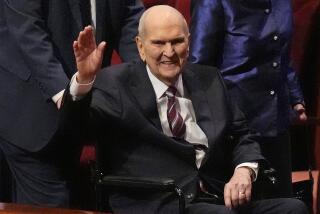Pastor in Long Father-to-Son Line Nominated to Be Church President
A clergyman who is the 14th in a father-to-son line of pastors of the Christian Church (Disciples of Christ) going back to its beginnings 176 years ago has been tapped to become its head.
The Rev. John O. Humbert, an Ohioan whose great-great-great-grandfather was a colleague of a denominational founder, Thomas Campbell, was nominated last week to become the church’s next general minister and president.
Like Campbell, who in 1809 issued the church’s pioneering ecumenical credo that “the church of Christ on earth is essentially, intentionally and constitutionally one,” Humbert shares that vision.
“My commitment is to the primary biblical mandate for reconciliation of the whole human family,” he says. “The unity of the church is a movement toward that reconciliation.”
1.2 Million Members
Humbert, 57, was advanced for the chief executive post of the 1.2 million-member denomination to succeed the Rev. Kenneth L. Teegarden, retiring in August after 12 years in office.
Picked by two-thirds of the voting members in a secret ballot of the church’s 44-member administrative committee from among 108 proposed candidates, Humbert’s nomination still must gain a two-thirds vote of the 181-member general board in May and of about 4,500 delegates at a general assembly in August.
But these bodies in the past consistently have confirmed the nominating committee’s choice. Election is for a six-year term, with reelection possible but retirement mandatory at 65.
The general minister and president is the church’s chief spokesman, presides over its national staff, based in Indianapolis, and represents it in ecumenical settings, such as the national and world church councils.
Humbert has been Teegarden’s deputy for the last eight years, and before that he was a pastor for 28 years, mostly in Ohio.
Early Unification Effort
The denomination of 4,500 congregations, spread nationwide but with principal strength in the Midwest, Southwest and Southeast, was formed out of an early effort to unify Baptists, Presbyterians and other Protestants.
Ironically, it became still another denomination, but it has kept up its drive for Christian unity, and currently is headed into a new ecumenical partnership.
That pact, drawn up after six years of work by a joint commission of the Christian Church (Disciples) and the 1.7 million-member United Church of Christ, is subject to ratification by their national meetings this summer.
Both denominations stress the autonomy of individual congregations.
More to Read
Sign up for Essential California
The most important California stories and recommendations in your inbox every morning.
You may occasionally receive promotional content from the Los Angeles Times.








